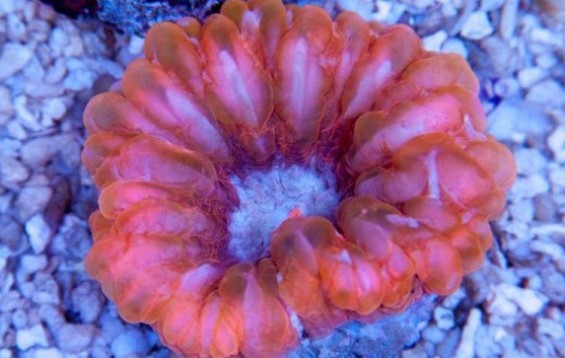- Name:
Blue Eye Cynarina
(View AKA's) - Family: Mussidae
- Species: Cynarina
- Scientific Name: Cynarina lacrymalis


General info about Blue Eye Cynarina
Of all the species from the Mussidae Family, corals from the Cynarina genus are considered to have the largest single polyp, where they cancbe either free living or attached to a substrate. Their anatomical structure is generally round or oval with fleshy lobes. They are easy to care with since they tolerate a wide range of environmental conditions.
For the Blue Eye Cynarina, they are predominatly colored blue with brown lines. This are the water parameters for cultivating Blue Eye Cynarina:
- Calcium: 400 - 430 ppm
- Alkalinity: 2.86 - 3.93 MEQ/L (8 - 11 dKH)
- Phosphates: 0
- Magnesium: 1200 - 1350
- Strontium: 8 -10
- Temperature: 74° - 83° F (23° - 28° C)
- Salinity / Specific Gravity: 1.023 - 1.025
Blue Eye Cynarina Diet & Nutrition
Blue Eye Cynarina can survive without feeding courtesy from the nourishment it recieves from the symbiotic zooxanthellae that is living within them. However, they will not grow in to a bigger colony. With this and for faster growth, you need to feed them with supplemental foods like krill, mysis or brine shrimp. The addition of dissolved organics is also recommended.
Fragging / Propagating Blue Eye Cynarina
A mature tank is highly recommended in propagating Blue Eye Cynarina. They need to be set at the bottom portion of the tank where lighting and flow rate are in moderation.
Flow / Lighting Requirements for Blue Eye Cynarina
Blue Eye Cynarina requires moderate lighting and moderate water flow. Too much water flow causes the polyps to be retracted and feeding cannot take place.
Blue Eye Cynarina Origin
Blue Eye Cynarina can be found in the Indo-west Pacific Ocean. They are now listed as a threatened species under Appendix II of the Convention on International Trade in Endangered Species (CITES), which means that their global trading is now monitored.
Caution Should be Taken with Blue Eye Cynarina
Blue Eye Cynarina must be set in the tank with enough spacing in relation to other coral species.
How to Acclimate Blue Eye Cynarina
Since the Blue Eye Cynarina is a marine species, salinity must be entirely maintained at 1.023 to 1.025 specific gravity. They should be immediately set to its receiving substrate like rocks and be permanently positioned using gel glue so that the colonization process can commence.
Original Detail
| Name | Species | Family | Scientific Name | More Detail | Added by |
|---|---|---|---|---|---|
| Blue Eye Cynarina | Cynarina | Mussidae | Cynarina lacrymalis | Of all the species from the Mussidae Family, corals from the Cynarina genus are considered to have the largest single polyp, where they cancbe either free living or attached to a substrate. Their anatomical structure is generally round or oval with fleshy lobes. They are easy to care with since they tolerate a wide range of environmental conditions. For the Blue Eye Cynarina, they are predominatly colored blue with brown lines. This are the water parameters for cultivating Blue Eye Cynarina:
|
PalaciosAn |
Changed by users
| Submitted Date | Submitted By | Status | Action |
|---|


